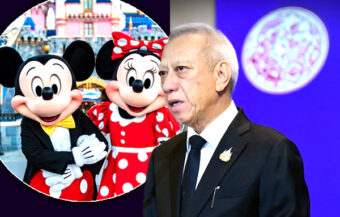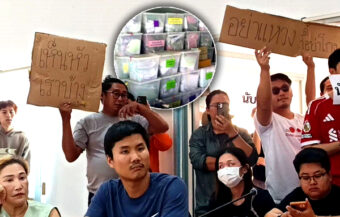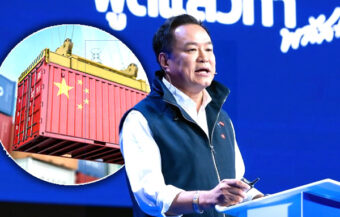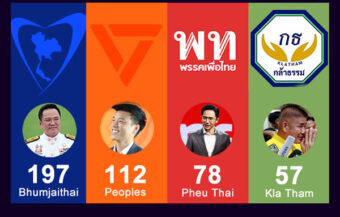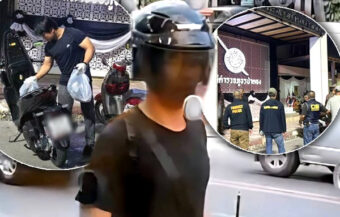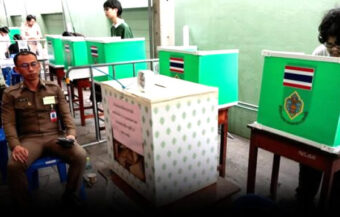China denies any role or stake in the Thai‑Cambodian border conflict after Chinese arms were used, as Thailand strengthens military readiness, closes crossings, reviews agreements, and manages humanitarian concerns while tensions still simmer along the frontier.
The Chinese Embassy in Bangkok moved swiftly on Thursday to deny any role or partisan stake in the ongoing border tussle between Thailand and Cambodia. The sharp rebuttal followed reports confirming that Chinese-made missiles were used in Cambodian attacks on Thai territory between July 24 and 28. Defence Minister Nattapol Nakpanit dismissed the revelation as old news, saying the weapons were part of joint drills earlier in 2025 and were never returned. But behind the denials, Thailand is clearly recalibrating its stance. A major shift in relations is underway, as border crossings remain sealed and military readiness ramps up along a frontier that’s rapidly becoming a fault line.
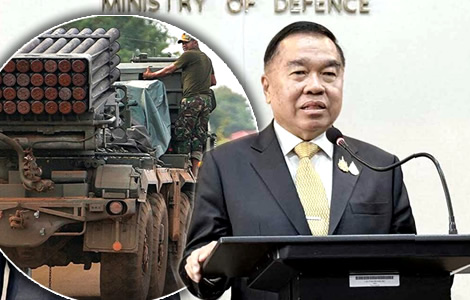
Thailand’s government has confirmed that it knew in advance about a Chinese arms shipment to Cambodia earlier this year. On Thursday, Defence Minister Nattapol Nakpanit told reporters that intelligence agencies detected Chinese rockets and artillery shells delivered in February 2025. He added that many of those weapons have remained on Cambodian soil ever since. The disclosure comes as border tensions between Thailand and Cambodia continue to grow.
Simultaneously, the Chinese Embassy in Bangkok issued a statement denying any direct role in recent clashes. It insisted that China remains neutral in the Thailand‑Cambodia dispute. Instead, it claimed its role is limited to mediation and peacemaking. Moreover, the embassy asserted that any Chinese arms in Cambodia come from previous bilateral cooperation and training programmes—not new transfers. It also called on all parties to act responsibly and avoid spreading unfounded rumours.
Thailand appears to be adapting its stance as tensions rise, signalling both caution and readiness along the Thai-Cambodia frontier.
Thailand confirms prior knowledge of Chinese arms sent to Cambodia this year as border tensions rise
On Wednesday evening, Thailand’s Cabinet convened an emergency meeting. Therein, legislators approved a special allocation of ฿864 million for the armed forces. These funds came from the central emergency fund.
Prime Minister Anutin Charnvirakul described the allocation as essential for strengthening Thailand’s border defences and military preparedness. However, he withheld detailed breakdowns, citing concerns over national security. “I can’t go into details,” he said, “this concerns our defence capabilities.”
Nevertheless, informed sources suggest that much of the funds will support infrastructure upgrades. For example, military planners expect construction of border fences, radars, and observation towers in key sectors. Additionally, logistics hubs, roads, and forward operating bases may receive sizable portions.
Importantly, deployment of mobile units and drone networks may also be boosted. All told, the allocation is designed to enhance Thailand’s deterrent posture on its eastern frontier.
Thailand faces humanitarian challenges as Cambodian residents face eviction notices. Flexibility hinted at
Yet the government faces humanitarian dilemmas even as it rallies forces. In Sa Kaeo Province, more than 400 Cambodian nationals live in areas deemed Thai state or forestry land. These residents received a notice to vacate by October 10.
However, Prime Minister Anutin suggested in his Thursday statements that the deadline might not be strictly enforced. He proposed a more compassionate approach, promising at least procedural flexibility.
Still, his messaging was ambiguous. He said: “The October 10 deadline is unlikely to be kept,” but declined to propose a new date. Meanwhile, Cambodian families complain of short notice and fears of displacement. They say they lack alternative housing and worry about their children’s safety. Consequently, critics accuse Thailand of heavy‑handed tactics. Yet the government insists it will handle the process humanely.
In parallel, Thailand is reshaping its border policy with Cambodia. In recent months, crossings have been closed permanently. That will remain the same for now. Military units have surged to border zones in Sa Kaeo, Surin and Si Sa Ket provinces. Roadblocks and fortified checkpoints now dot key routes.
Military and political moves as Thailand prepares for all contingencies and reviews Cambodian MOUs
Moreover, observers note increased movement of artillery, fuel convoys, and mobile elements near flashpoint areas. Clearly, Bangkok is preparing for all contingencies.
Furthermore, Thailand’s National Security Council confirmed it is reviewing controversial Memorandums of Understanding (MOUs) with Cambodia. These MOUs regulate border cooperation, development zones, and resource sharing.
Deputy Prime Minister Boonchuay Watchapo announced that these agreements will face a referendum concurrent with the next general election. He pledged to put their cancellation to a public vote. Not surprisingly, the move shocked many in opposition parties.
Pheu Thai and other opposition groups slammed the plan. They warned that cancelling the MOUs could weaken Thailand’s legal standing—especially in sectors such as maritime and territorial arbitration. In particular, Thailand’s overlapping claims with Cambodia in the Andaman Sea’s oil and gas zones would face renewed vulnerability. Without formal legal frameworks, Cambodia might escalate claims in international tribunals. Thus, the opposition argues cancellation invites risk, not relief.
Defence minister warns Cambodia knows Thai military capabilities while stressing no new Chinese arms
Meanwhile, Defence Minister Nattapol continued to press the issue of Cambodia’s apparent insight into Thailand’s capabilities. He said Cambodia “knows almost everything” about Thai forces—notably weapons, deployments, and readiness.
He attributed this to televised parliamentary sessions that revealed strategic detail. In contrast, he stressed, Cambodia keeps its military posture largely opaque. He warned that this intelligence gap places Thailand at a tactical disadvantage.
Nonetheless, he insisted there is no evidence of further Chinese arms shipments since the conflict erupted. Instead, he suggested Cambodia’s arsenal likely stems from past cooperation and military exchanges. In this view, the roots of the dispute extend beyond recent clashes. Yet Thailand now must respond decisively.
He also addressed the procurement of replacement equipment. He said routine acquisition takes six months to one year. However, he noted the Comptroller General’s Department is granting exceptions to accelerate deliveries. He forecast the process could finish within two to three months—or possibly by year’s end. He confirmed the budget will support both personnel and hardware, though he refused to specify quantity or models.
China states its neutrality and urges ASEAN engagement while rejecting claims of support for Cambodia
At the diplomatic level, the Chinese Embassy’s rebuttal echoes Beijing’s cautious posture. The embassy reiterated its neutrality. Moreover, it emphasised China has no stake in the Thailand‑Cambodia border dispute.
It pledged continued support for ASEAN’s role in managing crises via dialogue. Therefore, China offered to maintain close contact with Thailand, Cambodia, and regional states. It also urged relevant parties to avoid inflammatory rhetoric and false claims.
In its statement, the embassy addressed recent media reports suggesting Chinese rockets were used in Thai‑Cambodian clashes. It rejected those claims outright and asserted that any Chinese weapons in Cambodia are remnants of earlier cooperation—not fresh deployments. It called accusations “malicious news” and urged restraint.
Analysts observing the escalation say Thailand now faces a tight balancing act between diplomacy and deterrence. On one hand, Bangkok must preserve its reputation as a responsible regional stakeholder. On the other hand, it must protect sovereignty and assert border integrity. The ฿864 million boost signals seriousness. Moreover, the shift in the MOUs status reveals political resolve.
Uncertainties remain over Cambodian response and Thai eviction deadlines as border tensions simmer
Still, many questions remain unanswered. Will Prime Minister Anutin set a new eviction deadline for Cambodian residents? Will Cambodia retaliate with force or diplomacy? How will Thailand respond if Phnom Penh seeks international arbitration? Moreover, what disclosures will follow the Thursday National Security Council meeting? These factors will shape the next phase of confrontation.
Some observers see a broader geopolitical dimension. Thailand’s actions may deter other states from intervening overtly in Southeast Asia’s border disputes. Meanwhile, Cambodia may lean more heavily on China’s diplomatic shield. If so, ASEAN cohesion could suffer strain. Hence, Bangkok must tread carefully.
On the ground, Thai military units now enforce tighter control in disputed sectors. Helicopter sorties, night patrols, and drone reconnaissance have increased. Local civilian traffic faces delays and scrutiny. Security forces have urged villagers near the border to report suspicious movement. Authorities also warn of restricted access in buffer zones.
Opposition increases pressure on government over defence spending and military transparency
In Parliament, opposition parties have intensified pressure. Many demand full transparency on the ฿864 million allocation. They also call for oversight over procurement contracts. Critics warn of corruption, waste, or mismanagement in the rush to arm. The government insists safeguards exist. Nevertheless, trust is fragile.
Despite pressure, the ruling coalition may believe bold moves are necessary. After all, Thailand has long tolerated ambiguity along the Cambodian frontier. For years, border zones remained contested, even as diplomatic mechanisms existed. Now, Bangkok seems prepared to break from ambiguity.
PM confirms government’s referendum plan to scrap MOUs with Cambodia. Top People’s Party MP shocked
Thailand gives Cambodian squatters days to leave Thai soil or face prosecution and up to 15 years jail
In summary, Thailand is pivoting rapidly. With Chinese arms revelations, a major military budget boost, and revisions to cross‑border pacts, Bangkok is signalling seriousness. At the same time, it is trying to temper its approach with humanitarian gestures toward Cambodian civilians. Meanwhile, uncertainties loom large about how Cambodia, ASEAN, and China will react.
In the coming days, Thailand’s choices will matter. If it miscalculates, escalation may spiral. If it succeeds, it may reset the boundary of deterrence. For now, the nation watches closely—diplomacy in one hand, military readiness on the other.
Join the Thai News forum, follow Thai Examiner on Facebook here
Receive all our stories as they come out on Telegram here
Follow Thai Examiner here
Further reading:
PM confirms government’s referendum plan to scrap MOUs with Cambodia. Top People’s Party MP shocked
Leader of deadly scam gang in Cambodia and henchmen still at large with 4 more Thais arrested
Police in Cambodia close in on fake scam loan app leadership after family murders in Samut Prakan
Cambodian cybercrime industry run by Chinese criminals could be generating up to 38% of its GDP
Debt and ฿1.7 million loss to scammers drive man to murder his wife and two sons in Samut Prakan
Loan shark arrested in Nonthaburi for bullying a borrower charged an annual interest rate of 730%
Bank of Thailand to tackle household debt in new plan from 2024 which will see higher standards
Politicians skating on thin ice as the economy may not be able to withstand a political stalemate
Debt crisis may be one of the top items on the new cabinet’s agenda as central bank stands ready









